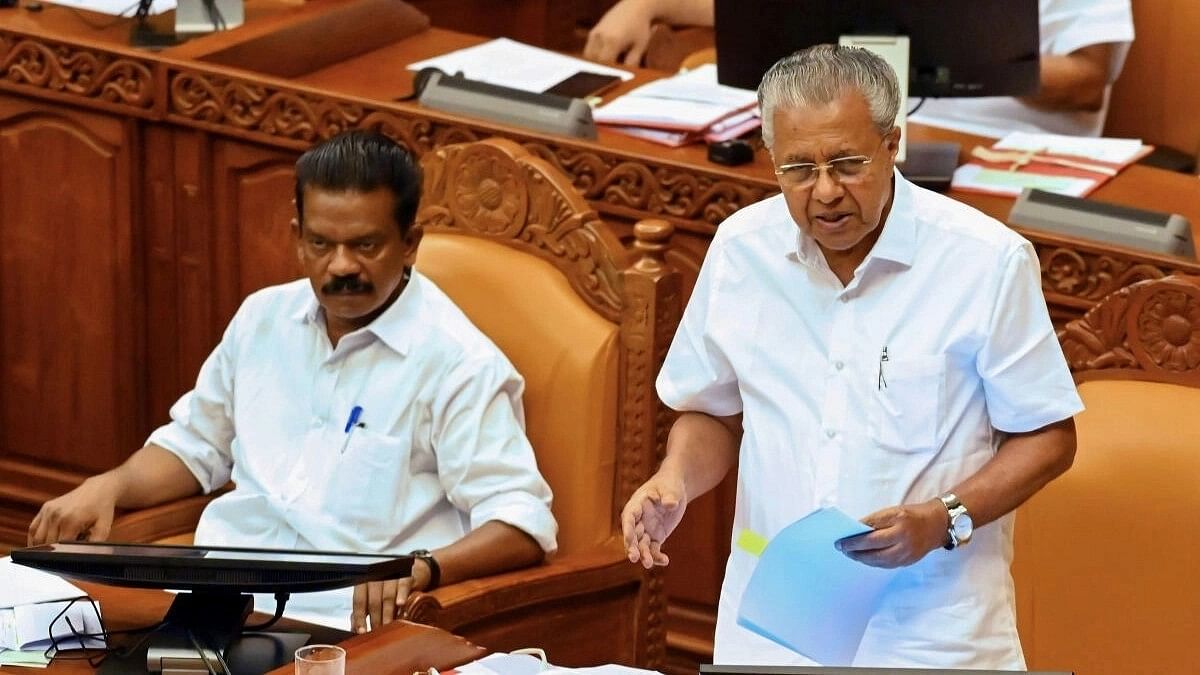
Kerala Chief Minister Pinarayi Vijayan addresses the Assembly session, in Thiruvananthapuram, Tuesday, Aug. 8, 2023. State cabinet minister K. Radhakrishnan is also seen.
Credit: PTI Photo
The Kerala assembly on Tuesday unanimously adopted a resolution urging the BJP-led Central government to refrain from implementing the Uniform Civil Code (UCC) in the country.
Kerala Chief Minister Pinarayi Vijayan who moved the resolution in the House against the UCC termed it as a "unilateral and hasty" action on the part of the Centre.
Vijayan contended that the UCC as visualised by the Sangh Parivar was not according to the Constitution, rather it was based upon the Hindu legal text "Manusmriti".
"That has been made clear by Sangh Parivar long back. They are not trying to implement something that is there in the Constitution. There is no need to misunderstand it like that," he said.
Vijayan contended that the ruling BJP government at the Centre only criminalised the divorce laws under the Muslim personal law, but has not done anything to ensure safety and security of women or take steps for the welfare of the marginalised.
The Mizoram assembly had in February this year unanimously adopted an official resolution opposing any move to implement the UCC in the country.
However, according to the Chief Minister's Office (CMO), Kerala is the first state to adopt a resolution against UCC after Prime Minister Narendra Modi in July advocated for a general civil code while addressing BJP workers in Bhopal in poll-bound Madhya Pradesh.
After the resolution was moved by the Chief Minister, several amendments and modifications were suggested by the Congress-led opposition UDF that welcomed the Left government's move.
Some of the modifications sought by the UDF were removal of the references to B R Ambedkar from the resolution and also the suggestion that UCC can be implemented after discussions with all stakeholders.
Leader of Opposition V D Satheesan said, "The UCC cannot be implemented even after holding discussions. There is no need to include that condition."
This suggestion that there should be no discussion on the implementation of UCC was raised by several other UDF MLAs, including N Samsudheen, an MLA of Congress ally IUML, who also said that the resolution should be focused and strongly convey to the Centre the stand of the state.
Some of the suggestions given by the opposition were accepted and included in the final resolution by the government, official sources said.
The Chief Minister, reading out the finalised resolution in the House, said that the state assembly was concerned and dismayed with the Centre's move to impose UCC as it was a unilateral and hasty decision that would take away the secular character of the country.
He questioned whether the implementation of the UCC would address the under-representation of tribals, dalits, minorities and the backward in education and employment?
He further questioned whether dalits, tribals and people from backward communities would be allowed to enter places of worship, offer prayers and even lead prayers?
"No constructive steps are being taken to address such core issues affecting Indian society," the Chief Minister contended.
He said that as the Lok Sabha elections are coming up, such issues are being created to divert attention from the problems people are facing.
Vijayan said the Constitution refers to having a general civil law only as a directive principle and it is not mandatory.
He said that when the freedom of religion is guaranteed under Article 25 of the Constitution and includes the right to follow and practice religious personal rules, any legislation prohibiting that would be a violation of the constitutional right.
The Chief Minister further contended that Article 44 of the Constitution merely states that the State shall endeavour to establish a common civil code.
He said that any such move has to be preceded by debates and discussions to create a consensus among the people and not doing so was concerning.
He said that the Kerala assembly too shares this concern and believes that imposition of UCC is a "non-secular move" to attack the unity of the people and the nation as a whole.
Vijayan said that even in the Constituent Assembly debates, there were differences of opinion with regard to the UCC and B R Ambedkar's position at that time was that the Parliament can try to bring a general civil law, but he did not insist that it should be compulsory. "He only indicated a possibility," the Chief Minister contended.
The CPI(M)-led government's decision to move the resolution came amid an ongoing campaign against the UCC by both the ruling Left and the opposition UDF in the state, as well as various religious organisations in Kerala.
Both the fronts had organised seminars separately in Kozhikode recently against the UCC, in which the representatives of various religious outfits took part.
The Law Commission of India had last month received submissions from the public regarding suggestions on implementing the UCC in the country.
In a recent statement, the Chief Minister alleged that the "electoral agenda" of the BJP was behind raking up the issue of the UCC and urged the Centre to withdraw from the move to impose it.
Vijayan, who is also a senior leader of the CPI(M), has said the Centre's move can only be seen as a plan to implement the "majority communal agenda of 'one nation, one culture' by wiping out the cultural diversity of the country".
"The Central government and the Law Commission should withdraw from the move to impose the Uniform Civil Code," he has said.